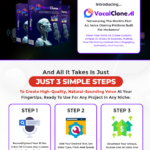In the bustling world of affiliate marketing, where competition is fierce and consumers are discerning, one element stands out as a beacon of success: content quality. Think of it as the North Star guiding you through the digital labyrinth of search engine algorithms and user expectations. High-quality content is not just a nice-to-have; it’s a must-have. It’s the secret sauce that can turn your affiliate marketing efforts from a gamble into a guaranteed win.
So, why is content quality so important? Well, imagine trying to sell a product to someone who doesn’t know what it is or how it can benefit them. It’s like trying to sell a Ferrari to a person who only knows how to ride a bicycle. High-quality content bridges this gap by providing valuable information, answering questions, and ultimately convincing potential customers that your product or service is the right choice.
My Proven Way to Make $100-$200 Per Day With 0 Investment – Watch THIS FREE Video to START >>

Understanding the Relationship Between Content Quality and SEO
Search engines, like Google, are constantly evolving to provide the most relevant and helpful information to users. One of the key factors they consider when ranking websites is content quality. Think of it as a competition where the most informative, engaging, and well-structured content wins the gold medal.
How Search Engines Prioritize High-Quality Content
- Relevance: The content must directly address the user’s search query. If your content doesn’t match the user’s intent, it’s unlikely to rank high.
- Authoritativeness: Search engines value content from reputable sources. If you can establish yourself as an expert in your niche, your content will be more likely to rank well.
- Freshness: Keeping your content up-to-date is important. Search engines prefer fresh content, as it’s more likely to be relevant to current trends and user needs.
- User Experience: A positive user experience is another crucial factor. This includes factors like page load speed, mobile-friendliness, and easy navigation.
User Experience and its Impact on SEO
User experience (UX) is the overall impression a user has when interacting with your website. It’s a complex concept that encompasses many elements, including:
- Readability: Is your content easy to read and understand? Use clear language, avoid jargon, and break up large blocks of text with headings and subheadings.
- Visual Appeal: Does your website look visually appealing? Use high-quality images and a consistent design.
- Mobile-Friendliness: Is your website optimized for mobile devices? More and more people are browsing the web on their smartphones and tablets.
- Page Load Speed: A slow website can frustrate users and lead to higher bounce rates. Optimize your website’s loading speed by compressing images and minimizing the use of unnecessary scripts.
Content Quality and User Engagement
High-quality content can significantly impact user engagement and dwell time. When users find your content informative, interesting, and helpful, they are more likely to stay on your website longer. This sends a positive signal to search engines, indicating that your content is valuable to users.
In addition to increasing dwell time, high-quality content can also encourage users to share your content on social media and link to it from other websites. This can help improve your website’s visibility in search engine results pages.
Keyword Research and Content Creation
Keyword research is the foundation of successful SEO. It involves identifying the specific keywords and phrases that potential customers are searching for. By targeting relevant keywords, you can ensure that your content appears in search engine results pages (SERPs) when users search for those terms.
The Importance of Targeted Keyword Research
- Understanding Your Audience: Keyword research helps you understand the language your target audience uses when searching for products or services. This knowledge allows you to tailor your content to their needs and preferences.
- Identifying Opportunities: Keyword research can help you discover untapped opportunities in your niche. By targeting long-tail keywords (more specific keyword phrases), you can reach a more targeted audience and reduce competition.
- Measuring Success: Tracking the performance of your targeted keywords can help you measure the success of your content marketing efforts. If your content is ranking well for relevant keywords, you’re more likely to attract qualified traffic and generate leads.
Creating High-Quality Content That Naturally Incorporates Relevant Keywords
Once you’ve identified your target keywords, it’s time to create high-quality content that naturally incorporates them. Here are some tips:
- Keyword Placement: Include your target keywords in the title, headings, subheadings, and body of your content. However, avoid keyword stuffing, which can harm your rankings and user experience.
- Keyword Relevance: Ensure that your keywords are relevant to the topic of your content. Using irrelevant keywords can confuse users and hurt your rankings.
- Natural Language: Incorporate keywords into your content in a natural and conversational way. Avoid keyword stuffing, which can make your content difficult to read and understand.
Balancing Keyword Density with Readability
While it’s important to include relevant keywords in your content, it’s equally important to maintain readability. Overusing keywords can make your content appear spammy and harm your rankings.
- Keyword Density: A good rule of thumb is to aim for a keyword density of 1-2% in your content. However, the ideal keyword density can vary depending on the length and topic of your content.
- Readability: Focus on creating content that is easy to read and understand. Use clear language, avoid jargon, and break up large blocks of text with headings and subheadings.
- User Experience: Remember that the ultimate goal is to create a positive user experience. If your content is difficult to read or understand, it won’t matter how many keywords you’ve included.
My Proven Way to Make $100-$200 Per Day With 0 Investment – Watch THIS FREE Video to START >>
The Power of Engaging and Informative Content
In the competitive world of affiliate marketing, standing out from the crowd requires more than just keyword optimization. It’s about creating content that is not only informative but also engaging and memorable.
The Value of Providing In-Depth and Informative Content
- Establishing Expertise: By providing in-depth and informative content, you establish yourself as an expert in your niche. This can help build trust with your audience and increase your credibility.
- Addressing User Needs: High-quality content addresses the needs and questions of your target audience. By providing valuable information, you can solve their problems and offer solutions.
- Encouraging Engagement: In-depth and informative content encourages users to stay on your website longer and engage with your content. This can lead to higher conversion rates and improved search engine rankings.
Using Storytelling Techniques to Captivate Readers
Storytelling is a powerful tool that can help you connect with your audience on a deeper level. By incorporating storytelling techniques into your content, you can make it more engaging and memorable.
- Creating a Narrative: Develop a narrative that connects with your audience on an emotional level. This can help make your content more relatable and memorable.
- Using Characters: Create relatable characters that your audience can identify with. These characters can help bring your story to life and make it more engaging.
- Conflict and Resolution: Introduce conflict or challenges that your characters must overcome. This creates tension and keeps your audience engaged until the resolution.
The Role of Visuals (Images, Videos) in Enhancing Content Quality
Visuals can enhance the quality of your content and make it more engaging. They can also help break up large blocks of text and improve readability.
- Visual Storytelling: Use visuals to enhance your storytelling and create a more immersive experience for your audience.
- Explaining Complex Concepts: Visuals can be used to explain complex concepts in a simple and easy-to-understand way.
- Improving Engagement: Visuals can help improve user engagement and reduce bounce rates.
- SEO Benefits: Visuals can also improve your SEO by making your content more shareable and linkable.
Building Trust and Authority Through Content
In the world of affiliate marketing, trust is paramount. Building trust with your audience can help you establish yourself as a credible authority in your niche, leading to increased conversions and long-term success.
Establishing Credibility as an Affiliate Marketer
- Transparency: Be transparent about your affiliate relationships. Disclose any affiliate links or partnerships you have.
- Expertise: Demonstrate your expertise by providing valuable and informative content. The more you know about your niche, the more credible you’ll appear.
- Authenticity: Be authentic and genuine in your writing. Let your personality shine through.
- Social Proof: Use social proof to establish your credibility. This can include testimonials, reviews, and social media followers.
Providing Accurate and Up-to-Date Information
- Fact-Checking: Always fact-check your information before publishing it. Inaccurate or outdated information can damage your credibility.
- Staying Informed: Stay up-to-date with the latest trends and developments in your niche. This will help you provide relevant and valuable information to your audience.
- Updating Content: Regularly update your content to ensure that it remains accurate and relevant. This shows that you’re committed to providing the best possible information to your audience.
The Importance of Original Content
- Avoiding Duplicate Content: Duplicate content can harm your search engine rankings and damage your credibility.
- Providing Value: Original content provides value to your audience and helps you stand out from the competition.
- Building Authority: Creating original content can help you establish yourself as an authority in your niche.
- Engaging Your Audience: Original content is more likely to engage your audience and encourage them to share your content on social media.
Measuring and Optimizing Content Performance
To ensure that your content marketing efforts are effective, it’s essential to track and analyze your content’s performance. This data can help you identify areas for improvement and optimize your content strategy.
Key Metrics to Track Content Performance
- Organic Traffic: This metric measures the amount of traffic your content receives from search engines.
- Conversions: If your goal is to generate leads or sales, track your conversion rate. This metric measures the percentage of visitors who take a desired action, such as making a purchase or signing up for a newsletter.
- Time on Page: This metric measures how long visitors spend on your website. A high average time on page indicates that your content is engaging and valuable.
- Bounce Rate: This metric measures the percentage of visitors who leave your website after viewing only one page. A high bounce rate suggests that your content is not relevant or engaging.
- Social Shares: This metric measures how often your content is shared on social media. A high number of shares indicates that your content is valuable and interesting to your audience.
Using Analytics Tools to Identify Areas for Improvement
To track and analyze your content performance, you’ll need to use analytics tools. Popular options include Google Analytics, Ahrefs, and SEMrush. These tools can provide you with valuable insights into your website’s traffic, engagement, and conversion rates.
- Identifying High-Performing Content: Use analytics tools to identify your top-performing content. This can help you understand what resonates with your audience and inform your future content strategy.
- Identifying Areas for Improvement: Analyze your content performance data to identify areas for improvement. This may include optimizing your content for specific keywords, improving your website’s user experience, or creating more engaging content.
Continuously Updating and Optimizing Content Based on Performance Data
Once you’ve identified areas for improvement, it’s important to take action. This may involve updating existing content, creating new content, or optimizing your website’s structure and navigation.
- Updating Existing Content: If you find that older content is underperforming, consider updating it to make it more relevant and engaging.
- Creating New Content: If you identify a gap in your content strategy, create new content to fill it.
- Optimizing Your Website: Make sure your website is optimized for search engines and user experience. This may involve improving your website’s loading speed, mobile-friendliness, and navigation.
By continuously monitoring and optimizing your content performance, you can ensure that your affiliate marketing efforts are effective and help you achieve your goals.
My Proven Way to Make $100-$200 Per Day With 0 Investment – Watch THIS FREE Video to START >>
Conclusion
In the ever-evolving landscape of affiliate marketing, content quality remains a cornerstone of success. By understanding the relationship between content quality and SEO, conducting thorough keyword research, creating engaging and informative content, building trust and authority, and continuously measuring and optimizing performance, you can effectively harness the power of content to drive traffic, generate leads, and achieve your affiliate marketing goals.
Remember, content is not just about keywords and rankings; it’s about providing value to your audience and building lasting relationships. By focusing on creating high-quality content that resonates with your target audience, you can position yourself as a trusted authority in your niche and achieve long-term success in the competitive world of affiliate marketing.









